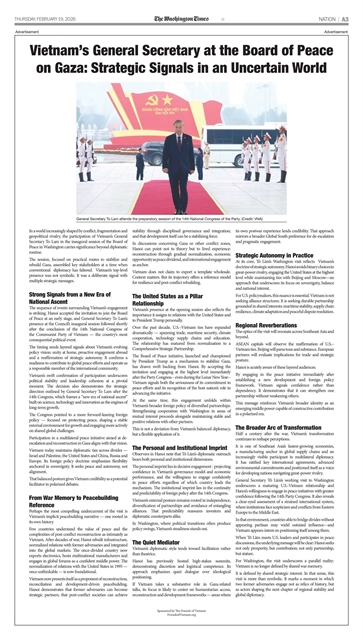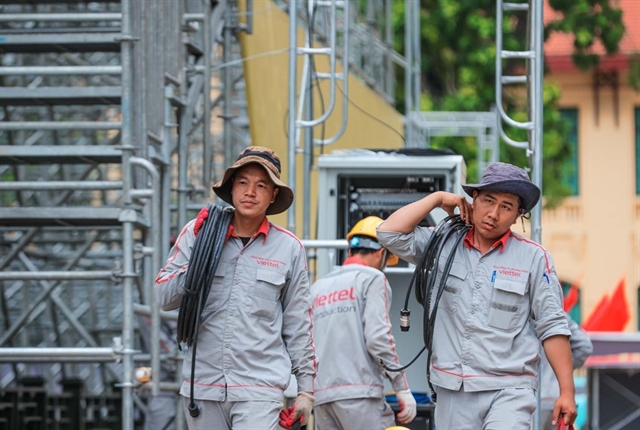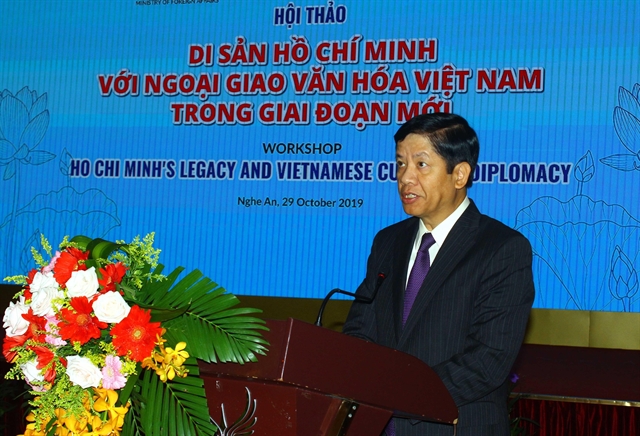 Politics & Law
Politics & Law


|
| Nguyễn Quốc Cường, Deputy Minister of Foreign Affairs speaks at the workshop entitled Hồ Chí Minh’s legacy for Vietnamese cultural diplomacy” held in the central province of Nghệ An on Tuesday. VNA/VNS Photo Tá Chuyên |
NGHỆ AN — President Hồ Chi Minh was the founder of comprehensive diplomacy in Việt Nam, including cultural diplomacy, creating the momentum for the country’s external relations in the integration process, said Deputy Minister of Foreign Affairs Nguyễn Quốc Cường.
Addressing a workshop entitled “Hồ Chí Minh’s legacy for Vietnamese cultural diplomacy” held in the central province of Nghệ An on Tuesday, Cường said Hồ Chí Minh's thoughts on diplomacy were a combination of patriotism, national culture and diplomatic traditions, the cultural quintessence of Eastern and Western nations and global diplomatic experience.
In recent years, cultural diplomacy had been carried out across continents through a network of Vietnamese representative missions in foreign countries as a tribute to President Hồ Chí Minh, he said.
“Travelling oceans and continents, from East to West, President Hồ Chí Minh gained during his formative years a unique perspective of the importance of intercultural dialogue as the foundation for mutual understanding and as an important communication tool,” said Micheal Croft, a representative of the United Nations Educational, Scientific and Cultural Organisation (UNESCO).
A global citizen long before the concept was termed, his extensive journeys abroad would have left him with a deep understanding of what motivated and attracted individuals to a cause – and where common ground was to be found between different peoples who lived on different sides of the planet, he said.
“Above all else, President Hồ Chí Minh was a humanist, and with his profound understanding of human nature came clarity on historical truth.”
Viengxay Darasane, Minister-Counsellor of the Lao embassy in Việt Nam, said when talking about President Ho Chi Minh, the Lao people always expressed their love and respect for the genius leader, who was a great teacher of the working class and Vietnamese people and devoted his life to the cause of national liberation, independence and freedom.
Đoàn Thị Tuyết Nhung, head of the World News Department under the Vietnam News Agency, said: “In the eyes of the Vietnamese and world people, President Ho Chi Minh was a symbol of national liberation and independence.”
There are over 200 works and research on the late president, and hundreds of journals have written thousands of articles about him, she said.
Participants also highlighted the immense value of President Hồ Chí Minh's legacy for Vietnamese diplomacy, and at the same time suggested ideas to promote his ideas with the aim of improving the effectiveness of Vietnamese cultural diplomatic activities.
“President Hồ Chí Minh's affection for people around the world and the love the people had for him will continue to be an inspiration for literature, music and art,” Cường said.
“It is a bridge between Việt Nam and foreign friends. It is a valuable asset for Việt Nam to promote friendship relations with countries around the world.”
“I am confident that after the seminar, there will be new, lively and interesting works about his life and career.”
The workshop was also an opportunity to connect and strengthen the relationship between researchers and activities related to President Hồ Chí Minh, he said. -- VNS